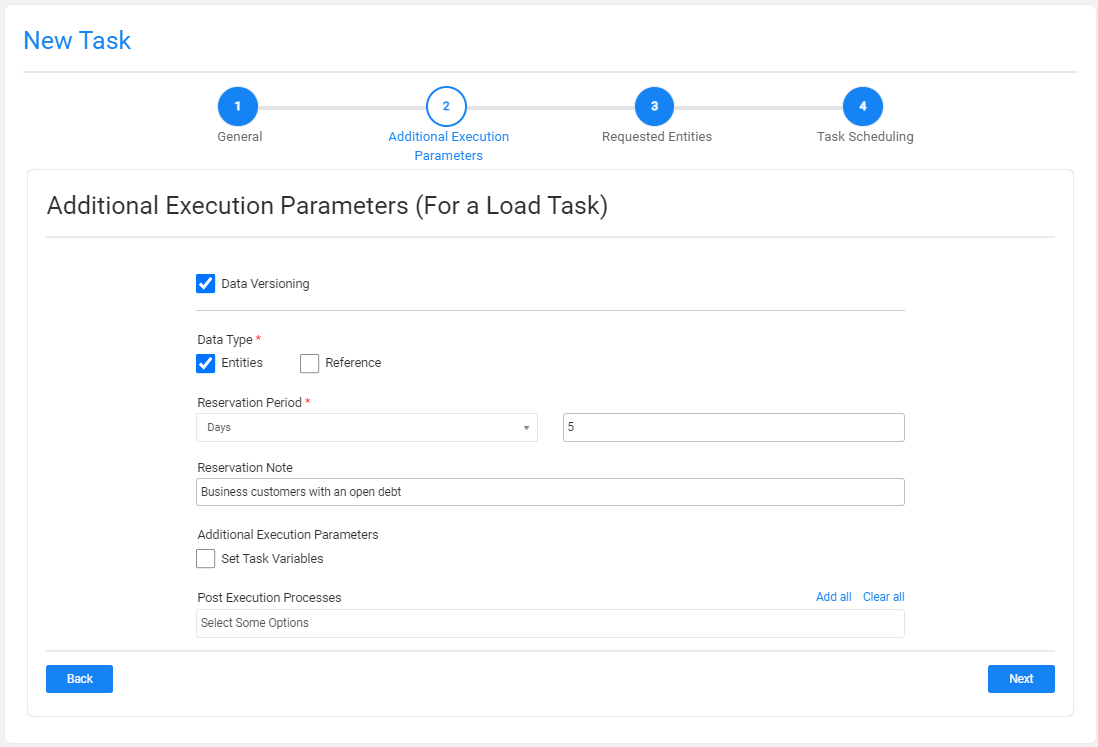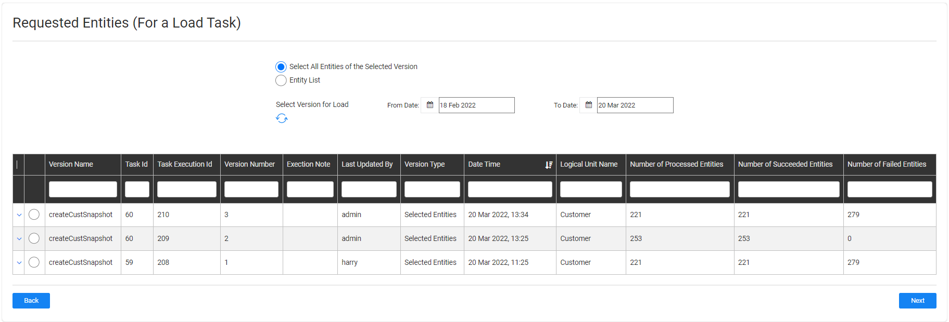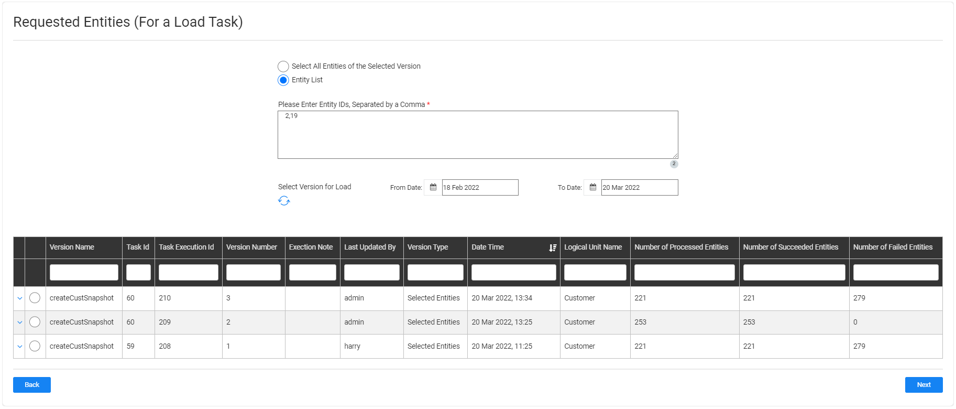TDM Load Task - Data Versioning Mode
A Load task contains the Load task type and loads (provisions) the task's entities and/or Reference tables to the target environment. A Data Versioning Load task gets the selected entities or Reference tables from the selected data version created on the source environment, deletes the current data from the target environment, and reloads the selected data version to the selected target environment.
An Load task contains the following tabs:
- General
- Additional Execution Parameters
- Requested Entities - opened if the Data Type contains entities.
- Task Scheduling
When checking the Set Task Variables setting, a new Task Variables tab opens.
When checking the Reference Data Type setting, a Reference tab opens.
Additional Execution Parameters Tab
The following execution parameters are set on Load Data Versioning tasks:

Data Versioning
- Check to set the task mode to Data Versioning.
Data Type
Check Entities and/or Reference to load them to the target environment selected in the Provision to Environment setting .
Note that the Entities must be checked in the task also includes an entity reservation (the Reserve task type is checked together with the Load task type).
Click here for more information about the reference handling.
Reservation Period
The reservation period settings are displayed if the load task also reserves the loaded entities on the target environment (the Reserve task type is checked together with the Load task type).
Note that when the Reservation Period is set to zero, the entities are reserved for unlimited period.
Only Admin and Environment owner users can reserve entities for unlimited period. Users that are attached to the target environment as testers must set a reservation period. The maximum number of days of a reservation period is set in the tdm_general_parameters TDB DB table in the MAX_RESERVATION_DAYS_FOR_TESTER parameter.
The start date of the reservation period is the task's execution time. The reservation period can be set in minutes, hours, days, or weeks.
Reservation Note
This setting has been added by TDM 7.5.2. The user can populate it with a free text. The reservation note is displayed in the Reserved Entities window (Notes fields) and can be used for filtering the reserved entities display. The reservation note can be edited using the Reserved Entities window.
Additional Execution Parameters
Set Task Variables
Check to open the Task Variables tab and set the variable value on a task level.
Post Execution Processes
Select all, partial, or one post execution process of the selected BE.
Requested Entities Tab
This tab is opened when the task's Data Type includes entities. It displays a list of available data versions that can be selected and reloaded to the target environment. By default, the TDM Portal displays a list of the data versions created during the last month. To set a different period, edit the From Date and To Date settings:

The following selection methods are available on load tasks:
Select All Entities of the Selected Version
Reload all the entities in the selected data version into the target environment. The window displays all available versions created in the source environment for the task's LUs.
This option is only available for Admin users the the task's target environment owners.
Entity list
This is the default option. Populate the list of entities separated by a comma in the Entities List setting.
The TDM displays all available versions created in the source environment for the task's LUs and the selected entities.
Each update on the entities list may change the list of available versions for the task.

Select a version and click Next. The TDM revalidates the entities list and checks whether each entity and the related child IDs have been successfully synchronized into Fabric in the selected data version.
Notes:
Only one data version can be selected for a load task.
The Version Name is the Task Title of the extract task that created the version.
The Date Time is the execution date of the task. An extract task can be executed multiple times. Each execution creates a separate version and has its own date and time.
The Version Type setting indicates whether the extract task has been created for all entities, or for a selected list of entities.
The table holding the available versions can be sorted or filtered.
To update the list of available versions, click Refresh.
TDM Load Task - Data Versioning Mode
A Load task contains the Load task type and loads (provisions) the task's entities and/or Reference tables to the target environment. A Data Versioning Load task gets the selected entities or Reference tables from the selected data version created on the source environment, deletes the current data from the target environment, and reloads the selected data version to the selected target environment.
An Load task contains the following tabs:
- General
- Additional Execution Parameters
- Requested Entities - opened if the Data Type contains entities.
- Task Scheduling
When checking the Set Task Variables setting, a new Task Variables tab opens.
When checking the Reference Data Type setting, a Reference tab opens.
Additional Execution Parameters Tab
The following execution parameters are set on Load Data Versioning tasks:

Data Versioning
- Check to set the task mode to Data Versioning.
Data Type
Check Entities and/or Reference to load them to the target environment selected in the Provision to Environment setting .
Note that the Entities must be checked in the task also includes an entity reservation (the Reserve task type is checked together with the Load task type).
Click here for more information about the reference handling.
Reservation Period
The reservation period settings are displayed if the load task also reserves the loaded entities on the target environment (the Reserve task type is checked together with the Load task type).
Note that when the Reservation Period is set to zero, the entities are reserved for unlimited period.
Only Admin and Environment owner users can reserve entities for unlimited period. Users that are attached to the target environment as testers must set a reservation period. The maximum number of days of a reservation period is set in the tdm_general_parameters TDB DB table in the MAX_RESERVATION_DAYS_FOR_TESTER parameter.
The start date of the reservation period is the task's execution time. The reservation period can be set in minutes, hours, days, or weeks.
Reservation Note
This setting has been added by TDM 7.5.2. The user can populate it with a free text. The reservation note is displayed in the Reserved Entities window (Notes fields) and can be used for filtering the reserved entities display. The reservation note can be edited using the Reserved Entities window.
Additional Execution Parameters
Set Task Variables
Check to open the Task Variables tab and set the variable value on a task level.
Post Execution Processes
Select all, partial, or one post execution process of the selected BE.
Requested Entities Tab
This tab is opened when the task's Data Type includes entities. It displays a list of available data versions that can be selected and reloaded to the target environment. By default, the TDM Portal displays a list of the data versions created during the last month. To set a different period, edit the From Date and To Date settings:

The following selection methods are available on load tasks:
Select All Entities of the Selected Version
Reload all the entities in the selected data version into the target environment. The window displays all available versions created in the source environment for the task's LUs.
This option is only available for Admin users the the task's target environment owners.
Entity list
This is the default option. Populate the list of entities separated by a comma in the Entities List setting.
The TDM displays all available versions created in the source environment for the task's LUs and the selected entities.
Each update on the entities list may change the list of available versions for the task.

Select a version and click Next. The TDM revalidates the entities list and checks whether each entity and the related child IDs have been successfully synchronized into Fabric in the selected data version.
Notes:
Only one data version can be selected for a load task.
The Version Name is the Task Title of the extract task that created the version.
The Date Time is the execution date of the task. An extract task can be executed multiple times. Each execution creates a separate version and has its own date and time.
The Version Type setting indicates whether the extract task has been created for all entities, or for a selected list of entities.
The table holding the available versions can be sorted or filtered.
To update the list of available versions, click Refresh.




